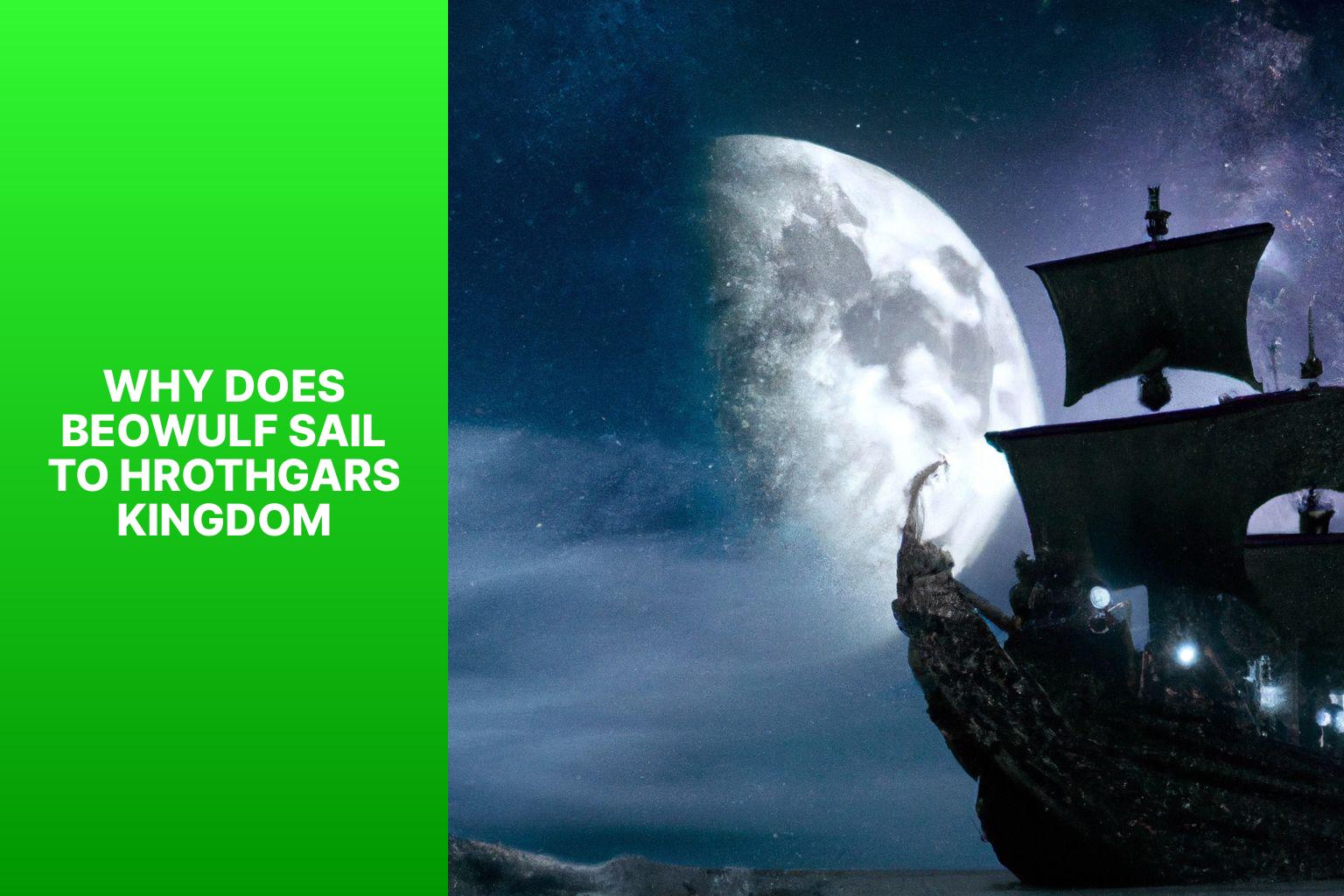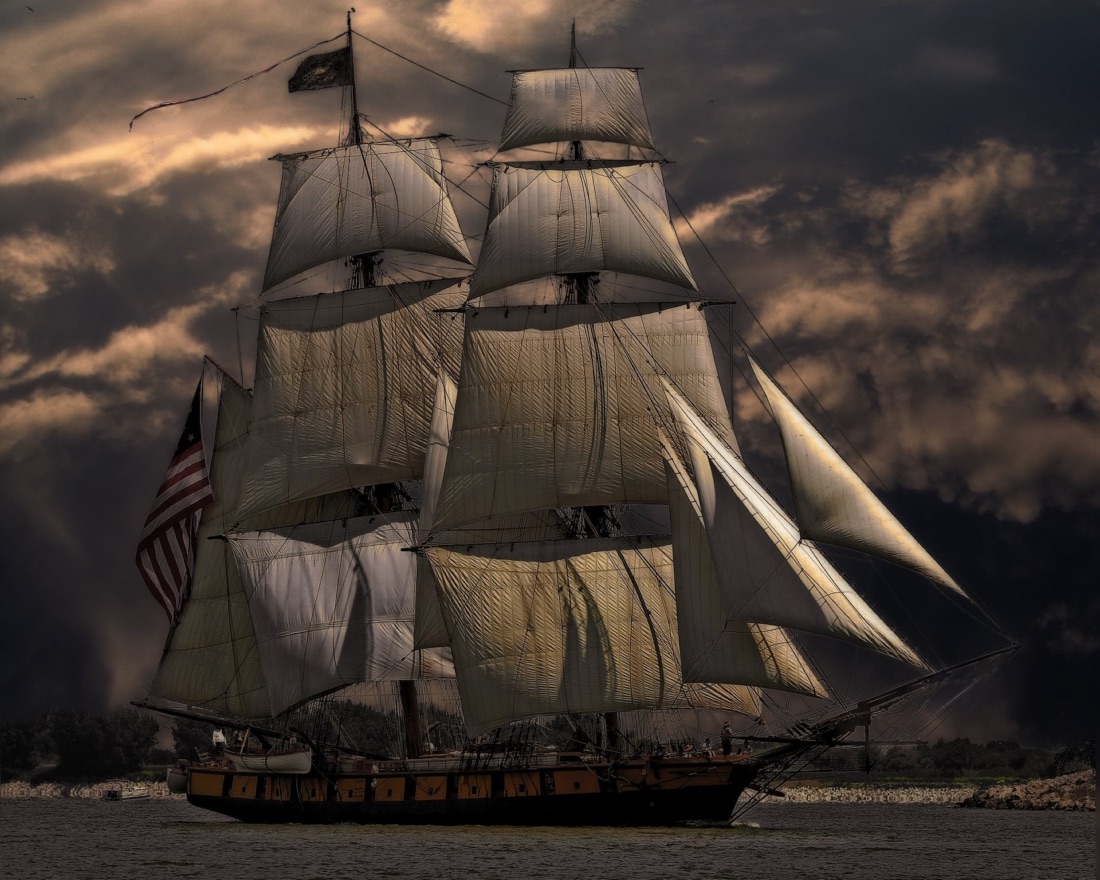Beowulf, a legendary epic poem written in Old English, tells the tale of a noble warrior who embarks on a perilous journey to the kingdom of Hrothgar. This article aims to explore the reasons behind Beowulf’s sail to Hrothgar’s kingdom and the motivations that drive him.
Hrothgar’s kingdom is plagued by a menacing threat in the form of Grendel, a vicious monster that terrorizes the land. The people live in fear and despair, seeking a hero who can vanquish this monstrous foe. Beowulf, hearing of the plight of Hrothgar and his people, is motivated to come to their aid and offer his assistance in defeating Grendel.
Beowulf’s motivations can be attributed to various factors. The pursuit of honor and glory plays a significant role. By slaying Grendel and saving Hrothgar’s kingdom, Beowulf seeks to establish his name as a fearless and valiant warrior, earning the respect and admiration of his peers.
Beowulf is driven by the heroic code and a sense of duty. As a warrior bound by the values of loyalty, courage, and honor, it is his moral obligation to protect those in need and uphold justice. Beowulf sees it as his duty to confront Grendel and restore peace to Hrothgar’s kingdom.
Beowulf’s friendship with Hrothgar also contributes to his motivation. The two rulers have a history of camaraderie and mutual support, and Beowulf feels compelled to aid his old friend in his time of need.
The journey to Hrothgar’s kingdom is not without perils. Beowulf and his companions face numerous challenges and dangers along the way. The sea voyage itself is of great importance, representing a symbolic passage from one realm to another, from the known to the unknown, and from ordinary life to the realm of heroic deeds.
Once Beowulf arrives at Hrothgar’s kingdom, he is received with great honor and respect. The reception signifies the importance and urgency of the task at hand. Beowulf introduces himself and states his purpose, making it clear that he has come to defeat Grendel and bring peace to Hrothgar’s realm.
Key takeaway:
- Beowulf sails to Hrothgar’s kingdom to face the menacing threat of Grendel: Grendel poses a great danger to Hrothgar’s kingdom, and Beowulf journeys to confront and defeat this dangerous adversary.
- Beowulf’s motivation is fueled by honor, glory, and a sense of duty: Beowulf seeks to prove himself as a heroic figure by facing the challenges posed by Grendel and upholding the heroic code.
- The perilous sea voyage is a critical part of Beowulf’s journey: The sea voyage undertaken by Beowulf and his men is fraught with dangers, serving as a test of their bravery and determination.
The Tale of Hrothgar’s Kingdom
Hrothgar’s kingdom stands as a tale of peril and heroism, with a menacing threat lurking in the shadows. Enter the realm of Grendel, where bravery and trepidation intertwine. As we unravel the mystery of this sub-section, we’ll witness the clash of unwavering courage and the unfathomable power that Grendel possesses. Brace yourself as we journey into the heart of Hrothgar’s kingdom, where battles are fought not only with swords but with the very essence of humanity.
The Menacing Threat of Grendel
The Menacing Threat of Grendel looms large in the epic poem Beowulf. This fearsome creature instills terror and mayhem as he ravages Hrothgar’s kingdom. Grendel, a formidable monster, possesses an insatiable hunger for destruction, leaving behind a trail of fear and despair.
With his immense strength and supernatural abilities, Grendel stealthily infiltrates Heorot, ruthlessly slaying unsuspecting warriors in their sleep. This relentless onslaught forces the warriors to live in constant fear, rendering them defenseless against the merciless beast.
The formidable presence of Grendel ultimately leads to the arrival of Beowulf and his heroic quest to vanquish the monster. The people of Hrothgar’s kingdom desperately seek a resolution to bring an end to Grendel’s reign of terror, and Beowulf emerges as their valiant savior. Motivated by the desire to restore peace and honor, Beowulf embarks on a treacherous journey to confront the menace that is Grendel.
Beowulf’s Motivation
Discovering the true motivations behind Beowulf’s journey to Hrothgar’s kingdom is like unraveling the layers of a legendary hero’s psyche. In this captivating section, we will dive into the depths of Beowulf’s motivation, exploring the themes of honor and glory, adherence to the heroic code and duty, and the profound bond of friendship with Hrothgar. Brace yourself for an immersive exploration into the driving forces that led Beowulf on his epic quest.
Honor and Glory
Honor and glory are crucial in the epic poem Beowulf. The main driving force behind Beowulf’s quest is his desire for honor and glory. He longs to establish himself as a hero and leave a lasting legacy.
In the poem, which portrays Anglo-Saxon culture, honor is earned through acts of valor and bravery. Beowulf’s battles against monstrous beings like Grendel and his mother exhibit his courage and strength, elevating him to the status of a hero. His actions not only safeguard Hrothgar’s kingdom but also earn him admiration and respect.
On the other hand, glory refers to the recognition and praise bestowed upon Beowulf for his heroic accomplishments. His triumphs in battle and the tales of his exploits spread far and wide, cementing his reputation as a legendary hero. Beowulf’s relentless pursuit of honor and glory becomes a driving force in his life, shaping his conduct and defining his character.
The themes of honor and glory in Beowulf emphasize the significance of reputation and the desire for immortality through acts of heroism. They showcase the values and ideals of the society in which the poem was crafted, where honor and glory held great value.
To truly appreciate Beowulf, one must delve into the intricate interplay between honor, glory, and the motivations of the heroic protagonist. It is through these lenses that the timeless messages and enduring significance of the epic poem are revealed.
Immerse yourself in the vivid storytelling and rich imagery of Beowulf, and let the tales of honor and glory inspire and captivate you.
Heroic Code and Duty
The epic tale of Beowulf highlights the significance of the heroic code and duty. Beowulf exemplifies his valor, honor, and loyalty by faithfully following this code. As a warrior and hero, his duty compels him to defend Hrothgar and his kingdom against the menacing threat of Grendel. The code stipulates that Beowulf’s primary motivation should not be personal gain, but rather the pursuit of glory and the fulfillment of his responsibilities.
Beowulf’s obligation to Hrothgar stems from their friendship and mutual respect. Upon his arrival at Hrothgar’s Kingdom, he is warmly received as a hero who will bring deliverance and restore tranquility. His objective is clear and unwavering – to confront Grendel and eradicate the terror that looms over the kingdom.
Throughout the epic, the actions of Beowulf are guided by the heroic code and duty. He embodies honor, bravery, and selflessness, serving as a role model for other warriors and underscoring the importance of upholding the heroic code.
Fact: In Anglo-Saxon society, the heroic code and duty held central importance. Warriors were expected to demonstrate bravery, loyalty, and honor in the face of adversity. These principles were deeply ingrained in their culture and are reflected in the epic poem Beowulf.
Friendship with Hrothgar
The friendship with Hrothgar is a significant aspect in the Beowulf epic. It plays a crucial role in motivating Beowulf and driving his quest to defeat Grendel. Here are some key points regarding the friendship with Hrothgar:
-
Hrothgar, the king of the Danes, holds great respect and admiration in the poem. He attracts Beowulf with his noble character and leadership.
For more information on Why Does Beowulf Sail To Hrothgar’s Kingdom, please click here.
-
Beowulf perceives Hrothgar as a wise mentor who can provide guidance in his heroic endeavors.
-
Hrothgar acknowledges Beowulf’s exceptional strength and bravery. He warmly welcomes him as an honored guest and extends his friendship.
-
Beowulf develops a deep bond with Hrothgar, pledging loyalty and vowing to aid him in conquering the monstrous Grendel, who terrorizes Hrothgar‘s kingdom.
-
The friendship between Beowulf and Hrothgar is characterized by mutual respect, trust, and admiration. They wholeheartedly support each other in their pursuits for honor, glory, and the protection of their people.
Fact: The friendship between Beowulf and Hrothgar symbolizes unity and cooperation against adversity. It underlines the significance of alliances and camaraderie in the ancient warrior cultures.
The Journey to Hrothgar’s Kingdom
Embark on a captivating adventure as we uncover the journey to Hrothgar’s kingdom in the epic tale of Beowulf. Brace yourself for the perils faced and the significance of the treacherous sea voyage. From dangerous encounters to the promise of glory, this section reveals the extraordinary path undertaken by Beowulf and his companions. So grab your map, gather your courage, and prepare for a voyage like no other.
The Perils Faced
The journey to Hrothgar’s Kingdom was fraught with numerous perils that Beowulf and his men had to face bravely. From harsh weather conditions like storms and turbulent seas, to constant threats of capsize from the waves and difficulty in navigation due to the relentless wind, these challenges tested their courage and resilience.
Sea monsters and other mythical creatures lurked beneath the depths, posing a significant threat. This required the crew to be constantly vigilant and ready to defend themselves. These fierce and powerful creatures added to the perils they faced throughout their journey.
The uncertainty of the journey itself and the looming possibility of getting lost made navigating through unfamiliar waters a skill that required expertise. The crew relied on their knowledge of the stars and navigational tools to find their way to Hrothgar’s Kingdom.
Despite all the perils faced, Beowulf and his men persevered, demonstrating their determination and bravery. These challenges only served to enhance their reputation as formidable warriors, proving themselves worthy of assisting Hrothgar and defeating the menacing threat of Grendel.
The Importance of the Sea Voyage
The sea voyage in Beowulf serves two crucial purposes: symbolizing the journey and challenges that the hero must face and showcasing Beowulf’s strength and valor. It is a formidable test of his bravery and determination as he defies treacherous waters to reach Hrothgar’s kingdom. By boldly opting to travel by sea, Beowulf vividly demonstrates his fearlessness and willingness to confront formidably arduous obstacles. The journey itself is perilous, with tempestuous storms and menacing sea monsters lurking along the way, poignantly highlighting Beowulf’s heroic qualities and foretelling his eventual triumph over Grendel.
Just as in Beowulf, the sea has played an extraordinarily significant role in real-life tales of exploration and discovery. Christopher Columbus‘s historic 1492 voyage across the Atlantic interconnected Europe with the Americas and splendidly paved the way for new prospects in exploration and colonization. Like Beowulf, Columbus faced an abyss of uncertainty and danger, battling through storms and grappling with the fear of venturing into unexplored territories. Nevertheless, their unyielding determination and unwavering belief in the profound importance of their missions propelled them forward. Columbus’s epochal sea voyage ultimately pioneered further exploration and facilitated the establishment of novel civilizations.
The true significance of the sea voyage cannot be comprehended lightly, both in Beowulf and in real-life narratives. It represents an unforgiving examination of one’s character, an extraordinary opportunity for heroes to substantiate their bravery and unwavering resilience, and serves as a gateway to boundless new possibilities.
Arrival at Hrothgar’s Kingdom
As Beowulf sets foot in Hrothgar‘s kingdom, a captivating chapter unfolds. You’ll witness Beowulf‘s grand reception, the intrigue surrounding his introduction, and uncover the true purpose of his arrival. Brace yourself for a tale filled with valor, ancient traditions, and the meeting of two legendary figures. Get ready to immerse yourself in the rich tapestry of this epic encounter.
Beowulf’s Reception
Beowulf’s arrival at Hrothgar’s kingdom is a crucial moment in the epic tale. Hrothgar, as the king, personally greets Beowulf and acknowledges his noble intentions. The warriors present at the reception also show their respect for Beowulf, admiring his skills and accomplishments. This reception solidifies Beowulf’s reputation as a renowned hero and establishes a strong bond with Hrothgar and his kingdom.
It sets the stage for the upcoming battles and highlights the importance of alliances and friendships in facing challenges and achieving victory. Explore other aspects of Beowulf’s journey, the motivations behind his actions, and the significance of the heroic code and duty in his character development. Uncover the intricacies of his friendship with Hrothgar and how it shapes their interactions throughout the epic. Stay tuned to learn more about Beowulf’s quest to defeat Grendel and the challenges he will face along the way.
Beowulf’s Introduction and Purpose
Beowulf’s arrival in Hrothgar’s kingdom is not without intention. Hrothgar and his court warmly welcome Beowulf, acknowledging his heroic deeds and reputation as a renowned warrior. Beowulf takes the opportunity to introduce himself and his true purpose: offering aid in defeating the menacing threat of Grendel, who instills fear in Hrothgar’s kingdom.
In Beowulf’s introduction, he places great emphasis on his courage, strength, and unwavering determination to fulfill his duty as a warrior. His main objective is to restore honor and glory to Hrothgar’s kingdom, embodying the heroic code that highlights the significance of bravery and selflessness. Beowulf’s friendship with Hrothgar creates a personal connection to his mission, demonstrating his loyalty and eagerness to assist a friend in need.
By effectively introducing himself and clarifying his purpose, Beowulf demonstrates his unwavering commitment to the task at hand, effectively setting the stage for subsequent battles and the ultimate quest of defeating Grendel. This serves to highlight his unfaltering dedication to protecting others from the forces of evil.
Pro-tip: When introducing oneself or discussing a purpose, it is imperative to convey confidence and clarity. It is crucial to articulate intentions clearly and showcase strengths and qualifications. This not only leaves a lasting impression but also enables others to comprehend one’s purpose and contributions more effectively.
Some Facts About Why Does Beowulf Sail To Hrothgar’s Kingdom:
- ✅ Beowulf sails to Hrothgar’s kingdom to come to the aid of King Hrothgar and his people who are being attacked by the hideous monster Grendel. (Source: cliffsnotes.com)
- ✅ Beowulf’s motives for sailing to Hrothgar’s kingdom are complex. He is a young warrior eager to earn glory and enhance his reputation, and he is on a lifelong quest for honor and immortality. (Source: microblife.in)
- ✅ Beowulf sails to Hrothgar’s kingdom with a small company of men determined to defeat Grendel. He wants to help Hrothgar defeat Grendel and gain more fame and glory in doing so. (Source: microblife.in)
- ✅ Beowulf travels from his own home in Geatland to the land of the Danes because of the terror that the monster Grendel has brought upon that land. Grendel had wreaked havoc upon the Danes for twelve years before Beowulf arrives. (Source: microblife.in)
- ✅ Beowulf kills Grendel with his bare hands and then kills Grendel’s mother with a giant’s sword. He comes to the land of the Danes to fight the monster Grendel and successfully defeats both Grendel and his mother. (Source: microblife.in)
Frequently Asked Questions
Why does Beowulf sail to Hrothgar’s kingdom?
Beowulf sails to Hrothgar’s kingdom to come to the aid of King Hrothgar and his people who are being attacked by the hideous monster Grendel. His motives for sailing to Denmark are complex.
What are Beowulf’s motives for sailing to Hrothgar’s kingdom?
Beowulf’s motives for sailing to Hrothgar’s kingdom include his desire to earn glory, enhance his reputation, and fulfill his lifelong quest for honor. There is a debt between Beowulf’s family and Hrothgar, as Hrothgar settled a feud by making a tribute payment to Beowulf’s enemies.
How does Beowulf describe himself when speaking to Hrothgar?
When speaking to Hrothgar, Beowulf emphasizes his lineage and accomplishments as a warrior, highlighting his noble stature, enormous size, and obvious strength. Reputation is an important theme in the epic, and Beowulf showcases his credentials to demonstrate his capabilities.
Why does Beowulf decide to fight Grendel without armor or sword?
Beowulf decides to fight Grendel without armor or sword because the ogre doesn’t use weapons. Although it is later revealed that Grendel is protected by a magic spell and cannot be harmed by weapons, Beowulf’s desire for honest glory and his impressive strength protect him in battle.
Does Beowulf encounter any challenges before fighting Grendel?
Before fighting Grendel, Beowulf encounters a challenge from Unferth, who interrupts the feast and insults Beowulf. Unferth questions Beowulf’s reputation and claims that he lost a swimming match to another boy named Breca. Beowulf responds calmly and counters Unferth’s assertions, showcasing his noble character and rhetorical skills.
How does Beowulf defeat Grendel and Grendel’s mother?
Beowulf defeats Grendel by fighting him with his bare hands and then kills Grendel’s mother with a giant’s sword. Beowulf’s strength, courage, and tactical skills allow him to overcome these monstrous adversaries and protect Hrothgar’s kingdom.





Leave a Reply